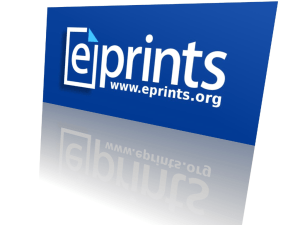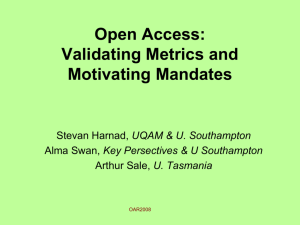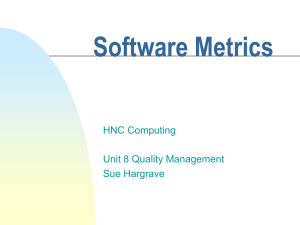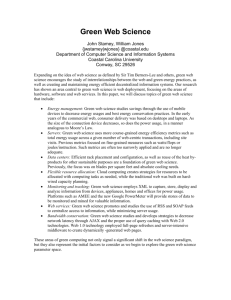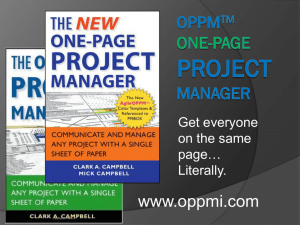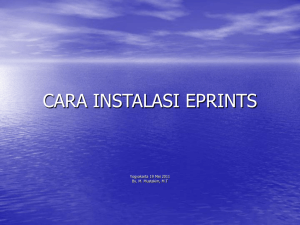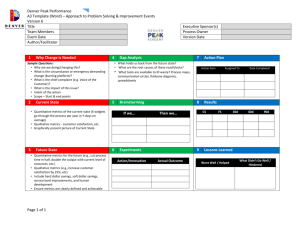Document
advertisement
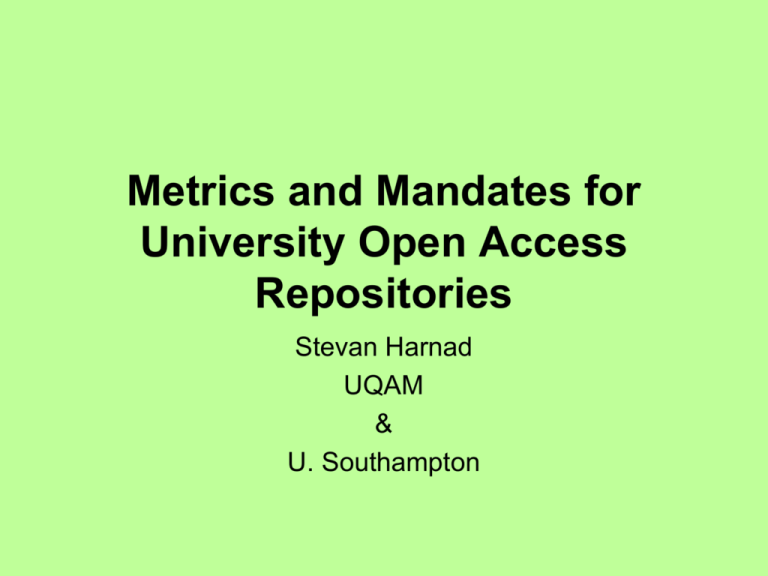
Metrics and Mandates for University Open Access Repositories Stevan Harnad UQAM & U. Southampton OA Timeline and Milestones • • • • • • • • • • Origin of the Universe: 14 billion years Origin of Life on Earth: 4 billion years Origin of our Species: 200,000 years Origin of Language: 100-200,000years Origin of Writing: 10,000 years Origin of Printing: 500 years Origin of Learned journals: 340 years Origin of Internet: 40 years Origin of Web: 18 years Origin of OAI: 9 years What is OA? Free online access Limited Access: Limited Research Impact Impact cycle begins: 12-18 Months Research is done Researchers write pre-refereeing “Pre-Print” Submitted to Journal Pre-Print reviewed by Peer Experts – “PeerReview” Pre-Print revised by article’s Authors Refereed “Post-Print” Accepted, Certified, Published by Journal Researchers can access the Post-Print if their university has a subscription to the Journal New impact cycles: New research builds on existing research Limited Access: Limited Research Impact Impact cycle begins: 12-18 Months Research is done Researchers write pre-refereeing “Pre-Print” Submitted to Journal Pre-Print reviewed by Peer Experts – “PeerReview” Pre-Print revised by article’s Authors Refereed “Post-Print” Accepted, Certified, Published by Journal Researchers can access the Post-Print if their university has a subscription to the Journal This limited subscription-based access can be supplemented by selfarchiving the Postprint in the author’s own institutional repository as follows: New impact cycles: New research builds on existing research Maximized Research Access and Impact Through Self-Archiving Impact cycle begins: 12-18 Months Research is done Researchers write pre-refereeing “Pre-Print” Submitted to Journal Pre-Print reviewed by Peer Experts – “Peer-Review” Pre-Print revised by article’s Authors Refereed “Post-Print” Accepted, Certified, Published by Journal Researchers can access the Post-Print if their university has a subscription to the Journal Post-Print is self-archived in University’s Eprint Archive More impact cycles: New impact cycles: New research builds on existing research What are “metrics”? • Objective measures of research quality and quantity • Only alternative is subjective human judgment (including peer review) • “Show me a philosopher who wishes to discard metaphysics and I’ll show you a metaphysician with a rival system” • (Show me someone who wishes to discard metrics, and I’ll show you a metrician with rival metrics) Metrics measure research uptake, usage and impact • Positive Feedback loop: • Mandates increase metrics • Metrics reward mandates Open Access: How? By mandating Green OA Self-Archiving OA Metrics motivate OA Mandates And OA Mandates maximize OA Metrics • Metrics: Metrics of research usage and impact quantify, evaluate, navigate, propagate and reward the fruits of OA self-archiving, motivating Green OA Mandates. • Mandates: Incentivized by the Metrics, Green OA selfarchiving Mandates, adopted by all universities and research funding agencies, will provide OA to 100% of research output, maximizing research usage and impact, productivity and progress. Brody et al (2007) Incentivizing the Open Access Research Web: Publication-, Data-Archiving and Scientometrics. CTWatch Quarterly 3(3). http://eprints.ecs.soton.ac.uk/14418/ “Online or Invisible?” (Lawrence 2001) “average of 336% more citations to online articles compared to offline articles published in the same venue” Lawrence, S. (2001) Free online availability substantially increases a paper's impact Nature 411 (6837): 521. http://www.neci.nec.com/~lawrence/papers/online-nature01/ Lawrence (2001) findings for computer science conference papers. More OA every year for all citation levels; higher with higher citation levels Contributors to the OA Advantage EA + QA + UA + (CA) + (QB) • EA: Early Advantage • QA: Quality Advantage • UA: Usage Advantage • (CA: Competitive Advantage) • (QB: Quality Bias) Early Access Advantage: OA is accelerating the research access/usage/citation cycle. OA articles are being cited sooner and sooner (Data from Physics Arxiv) Data from arXiv Downloads (“hits”) in the first 6 months correlate with citations 2 years later Most articles are not cited at all Earlier download metrics correlated with later citation metrics Brody, T., Harnad, S. and Carr, L. (2006) Earlier Web Usage Statistics as Predictors of Later Citation Impact. Journal of the American Association for Information Science and Technology (JASIST) 57(8): 1060-1072. http://eprints.ecs.soton.ac.uk/10713/ Time-Course and cycle of Citations (red) and Usage (hits, green) Witten, Edward (1998) String Theory and Noncommutative Geometry Adv. Theor. Math. Phys. 2 : 253 1. Preprint or Postprint appears. 2. It is downloaded (and sometimes read). 3. Next, citations may follow (for more important papers)… 4. This generates more downloads… 5. More citations... COMPETITIVE ADVANTAGE: The earlier you mandate Green OA, the sooner (and bigger) your university's competitive advantage: U. Southampton School of Electronics and Computer Science was the first in the world to adopt an OA self-archiving mandate. Mandated vs Unmandated OA Advantage Gold or Green? • OA journals: Gold OA • Self-archiving non-OA journal articles: Green OA Access to what? • Published peer-reviewed journal articles • Unrefereed preprints? • Monographs? • Data? Why OA? • Maximize research uptake, usage and impact • Direct benefit: Research progress • Side-Benefits: Developing world access, student access, public access How OA? • Self-archive in Institutional Repository • Institutions and Funders Mandate SelfArchiving Across all countries and disciplines, 95% of researchers report that they would comply with a self-archiving mandate from their funders and/or employers, and over 80% report that they would do so willingly. -- But only 15% self-archive spontaneously, if it not mandated. University of Tasmania +Repository -Incentive -Mandate Green line: total annual output Red line: proportion self-archived 700 600 500 400 300 200 100 0 Actual documents DEST publication s Jun- Jul- A S Oct- N D Jan- F M Apr- M Jun04 04 ug- ep- 04 ov- ec- 05 eb- ar- 05 ay- 05 04 04 04 04 05 05 05 Data courtesy of Arthur Sale 03/10/2005 03/09/2005 0 03/08/2005 03/07/2005 03/06/2005 03/05/2005 03/04/2005 03/03/2005 03/02/2005 03/01/2005 03/12/2004 03/11/2004 03/10/2004 03/09/2004 03/08/2004 03/07/2004 03/06/2004 03/05/2004 03/04/2004 03/03/2004 03/02/2004 Documents 4000 University of Queensland +Repository +Incentive -Mandate Green line: total annual output Red line: proportion self-archived 3500 3000 2500 2000 Total documents 1500 DEST documents 1000 500 Data courtesy of Arthur Sale Queensland University of Technology +Repository +Incentive +Mandate Green line: total annual output Red line: proportion self-archived 1800 1600 1200 Documents 1000 800 600 DESTreportable 400 24/ 09/2005 24/ 08/2005 24/ 07/2005 24/ 06/2005 24/ 05/2005 24/ 04/2005 24/ 03/2005 24/ 02/2005 24/ 01/2005 24/ 12/2004 24/ 11/2004 24/ 10/2004 24/ 09/2004 24/ 08/2004 24/ 07/2004 0 24/ 06/2004 200 24/ 05/2004 Documents 1400 Data courtesy of Arthur Sale Unanimous Recommendation by EUA, Jan 25 2008 791 universities in 46 countries All European Universities should create institutional repositories and should mandate that all research publications must be deposited in them immediately upon publication (and made Open Access as soon as possible thereafter) as already mandated by RCUK, ERC, and NIH, and as recommended by EURAB. In addition, the EUA recommends that these (funder) selfarchiving mandates should also be extended to all research results arising from EU research programme/project funding. NOW 54 & 10! The majority of journals (61%) already endorse immediate Green Open Access SelfArchiving of the postprint ROMEO/EPRINTS (Directory of Journal Policies on author OA SelfArchiving): http://romeo.eprints.org/ NOW 63% & 95% For the articles in the 37% of journals that have an embargo policy, the free EPrints institutional Repository-creating software has an ”Email Eprint Request" Button: The user who reaches the metadata for a Closed Access article puts his email in a box and clicks. This sends an automatic email to the author, with a URL on which the author clicks to automatically email the eprint to the requester. Once the ID/OA mandates are universally adopted, the embargoes will soon become obsolete, under growing OA pressure worldwide. Carr & Harnad (2005) Keystroke Economy: A Study of the Time and Effort Involved in Self-Archiving. http://eprints.ecs.soton.ac.uk/10688/ The free EPrints University Repository Software generates rich (and potentially even richer) usage metrics. It can be used for showcasing, navigating, comparing and assessing. Here is a sample of University Repository usage metrics for Southampton author Tim Berners-Lee: http://stats.eprints.ecs.soton.ac.uk/cgi-bin/irstats.cgi? Interoperable Repository Statistics Interoperable Repository Statistics Some EPrints download metrics for top deposits by Southampton author Tim Berners-Lee. These Local Repository Usage metrics at the individual university level can then be complemented by CITEBASE, which provides global Citation, Download, Co-citation, Hub/Authority, growth, and other metrics: http://stats.eprints.ecs.soton.ac.uk/cgi-bin/irstats.cgi? Sample citation and download growth with time. (Downloads only start in 2005 because that is when this paper was deposited.) Early growth rate and late decay metrics for downloads and citations can also be derived. Sample of candidate OA-era metrics: • • • • • • • Citations (C) CiteRank Co-citations Downloads (D) C/D Correlations Hub/Authority index Chronometrics: Latency/Longevity • Endogamy/Exogamy • Book citation index • • • • • • • Research funding Students Prizes h-index Co-authorships Number of articles Number of publishing years • Semiometrics (latent semantic indexing, text overlap, etc.) 36. These metrics can be validated in the UK Research Assessment Exercise (RAE), discipline by discipline, through multiple regression analysis: The metrics can be weighted by their ability to predict the rankings given by the evaluation by human peer panels: UK’s RAE 2008 will be a parallel panel/metric exercise, making it possible to develop a rich spectrum of candidate metrics and to validate each metric against the panel rankings, discipline by discipline, through multiple regression analysis, determining and calibrating the (“beta”) weights on each metric. Harnad, S. (2007) Open Access Scientometrics and the UK Research Assessment Exercise. Proceedings of 11th Annual Meeting of the International Society for Scientometrics and Informetrics 11(1) : 27-33, Madrid, Spain. Torres-Salinas, D. and Moed, H. F., Eds. http://eprints.ecs.soton.ac.uk/13804/ RAE 2001 Rankings for Psychology Research Assessment, Research Funding, and Citation Impact “Correlation between RAE ratings and mean departmental citations +0.91 (1996) +0.86 (2001) (Psychology)” “RAE and citation counting measure broadly the same thing” “Citation counting is both more costeffective and more transparent” (Eysenck & Smith 2002) http://psyserver.pc.rhbnc.ac.uk/citations.pdf SUMMARY: OA: How? Universities and funders mandate Green OA selfarchiving Deposit Where? In universities' own Institutional Repositories (IRs) Deposit How? A few minutes of keystrokes per paper is all that stands between the world research community and 100% OA Deposit What? Author's final, revised, peer-reviewed draft ("postprint") Deposit When? Immediately upon acceptance for publication Optimizing OA Self-Archiving Mandates: What? Where? When? Why? How? http://openaccess.eprints.org/index.php?/archives/136-guid.html Open Access: How? Universities adopt the ID/OA mandate: Immediate Deposit + Optional Access + Вот - некоторые полезные вебсайты Author’s URLs (UQAM & Southampton): http://www.crsc.uqam.ca/ http://users.ecs.soton.ac.uk/harnad/ BIBLIOGRAPHY ON OA IMACT ADVANTAGE: http://opcit.eprints.org/oacitation-biblio.html BOAI Self-Archiving FAQ: http://www.eprints.org/self-faq/ CITEBASE (scientometric engine): http://citebase.eprints.org/ EPRINTS: http://www.eprints.org/ OA ARCHIVANGELISM: http://openaccess.eprints.org/ ROAR (Registry of OA Repositories): http://roar.eprints.org/ ROARMAP (Registry of OA Repository Mandates): http://www.eprints.org/openaccess/policysignup/ ROMEO/EPRINTS (Directory of Journal Policies on author OA Self-Archiving): http://romeo.eprints.org/ 1995: Universal FTP Archives for Esoteric Science and Scholarship: A Subversive Proposal In: Scholarly Journals at the Crossroads. ARL. http://www.arl.org/scomm/subversive/toc.html 2001: Research access, impact and assessment THES 1487 http://cogprints.org/1683/ The Self-Archiving Initiative Nature 410 http://www.nature.com/nature/debates/e-access/Articles/harnad.html Measuring and Maximising UK Research Impact THES http://eprints.ecs.soton.ac.uk/7728/ Mandated online RAE CVs Linked to University Eprint Archives. Ariadne 35 http://www.ecs.soton.ac.uk/~harnad/Temp/Ariadne-RAE.htm 2004: Comparing the Impact of Open Access (OA) vs. Non-OA Articles in the Same Journals & Brody D-Lib http://www.dlib.org/dlib/june04/harnad/06harnad.html The Access/Impact Problem and the Green and Gold Roads to Open Access. et al Nature Web Focus. http://www.nature.com/nature/focus/accessdebate/21.html 2005: Journal publishing and author self-archiving: Peaceful Co-Existence Berners-Lee et al http://eprints.ecs.soton.ac.uk/11160/ Keystroke Economy: A Study of the Time and Effort Involved in Self-Archiving. Carr & Harnad http://eprints.ecs.soton.ac.uk/10688/ Ten-Year Cross-Disciplinary Comparison of the Growth of Open Access and Research Citation Impact. Hajjem et al IEEE Data Engineering Bulletin 28 http://eprints.ecs.soton.ac.uk/11688/ Making the case for web-based self-archiving Research Money 19 http://eprints.ecs.soton.ac.uk/11534/ 2006: Self-archiving should be mandatory 2006 Research Information http://eprints.ecs.soton.ac.uk/12738/ The Open Research Web: A Preview of the Optimal and the Inevitable Shadbolt et al in Open Access: Key Strategic, Technical and Economic Aspects http://eprints.ecs.soton.ac.uk/12453/ 2007: Open Access Scientometrics and the UK Research Assessment Exercise Proc 11th Ann Mtg Int Soc Scientometrics and Informetrics 11:27-33 http://eprints.ecs.soton.ac.uk/13804/ Time to Convert to Metrics Brody et al Research Fortnight 17 http://eprints.ecs.soton.ac.uk/14329/ Incentivizing the Open Access Research Web: Publication-, Data-Archiving and Scientometrics. Brody et al CTWatch Quarterly 3(3). http://eprints.ecs.soton.ac.uk/14418/
